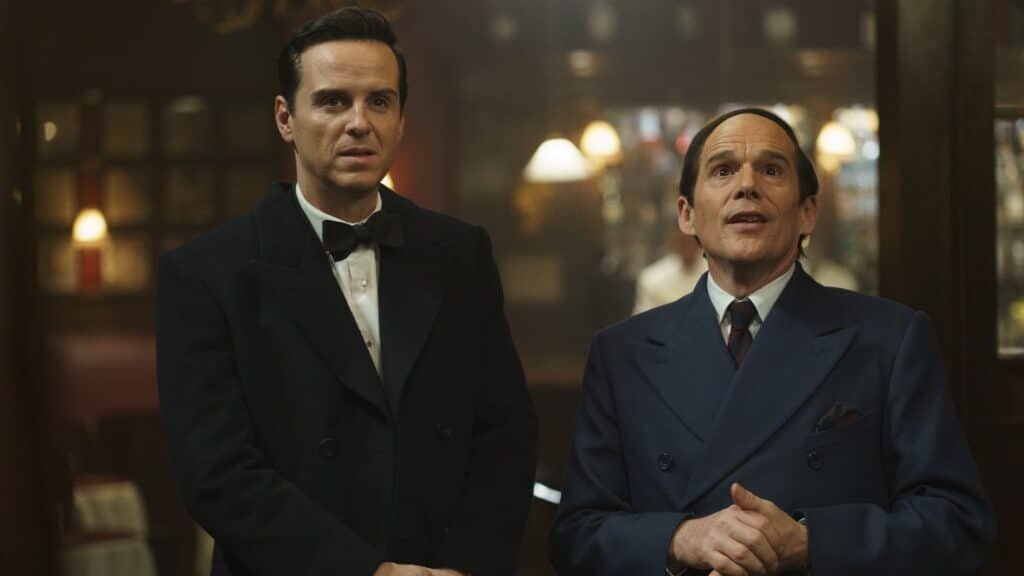‘Blue Moon’ Review
‘Blue Moon’ tells the story of troubled genius Lorenz Hart, who struggles with romance and drinking on the opening night of his former writing partner’s greatest success, ‘Oklahoma!’
‘Blue Moon’, the newest drama from chameleonic director Richard Linklater, feels like a stage play in the best possible way, set as it is entirely in a single location, over the course of a single night. Linklater’s direction is subdued, often invisible, ceding priority to the performances. Filled with incredible acting and powered by a witty, sharp script, ‘Blue Moon’ is a tragic dramedy, shocking in its warmth even as it portrays the indignities of a once-gifted artist having the worst night of his life, with nobody to blame but himself.
Ethan Hawke stars as Lorenz Hart, the real life lyricist and one half of a successful Broadway team with the composer, Richard Rodgers (Andrew Scott). The story begins with that partnership dissolved, as Rodgers opted to work instead with Oscar Hammerstein (Simon Delaney) on a new musical, Oklahoma!. On opening night for that eventual smash hit, Hart leaves the show early in disgust and goes straight to Sardi’s restaurant, the site for the opening night celebration. As he awaits the party to come, Hart holds court for all of the restaurant staff and patrons, talking candidly about his love life, his creative ambitions, and all of the hopes and frustrations therein. All the while, Hart needles the bartender, Eddie (Bobby Canavale), in the hopes of getting a drink despite having earlier insisted he not be served under any circumstances.
From the first time he walks onscreen, Ethan Hawke is unrecognizable as Lorenz Hart, with a horrible haircut and visual effects making him appear much shorter. Hart is a difficult protagonist, wearing you and the other characters down with his storytelling and showmanship, treating other people as extras in his personal movie who exist only to witness his genius. Hart is obnoxious … until he’s not, breaking down other characters’ defenses until they cling to him like moths to a troubled, insecure flame. Hawke highlights the tragedy of Hart, with so many small moments of anguish undercutting the bluster and flamboyance he uses as a defense mechanism. There are tender moments of Hart, listening to others with a false smile frozen on his face as his eyes convey so much pain, crying out for somebody to love him as he is.
Hawke’s stunning performance as Hart is further elevated by a game cast of supporting characters imbuing small roles with complexity and passion. Bobby Cannavale plays Eddie like the kind of warm, caring bartender that anybody would be lucky to encounter, even as he is torn between listening to Hart’s endless stories and doing his job. Margaret Qualley is charming and doting as Hart’s protégé, enchanting Hart even as she plays coy with her own ambitions and feelings. Then Andrew Scott storms into the film as Richard Rodgers, the first person we see who no longer has any patience for Hart’s charm offensive. Scott plays up his own character’s insecurities and frustrations, even as he can’t help but fall into nostalgic reveries with Hart, clearly still worrying about Hart’s opinions even as the rave reviews start pouring in.

Just as the film serves as a character study of the artist, Lorenz Hart, so too it interrogates the value and meaning of great art. Much of the creative conflict between Hart and Rodgers comes from a core disagreement on what kind of musicals they should be working on. Hart sneers at Oklahoma as simple and cheap, opting for crass sentimentality over the complicated emotions of reality. When he asks Rodgers what his dream musical project would be, Hart is legitimately stupefied that Rodgers responds, curtly, that Oklahoma is, in fact, his dream project.
Throughout the film, Hart challenges delusions of art that triggers powerful emotions if those emotions are false. In an earlier scene, all of the characters in the bar, including Hart, sing along to George M. Cohan’s ‘Over There’, relishing in the rah-rah patriotic feeling. But as soon as the song is over, Hart informs them all that soldiers in WWI would change the lyrics to “when we’re buried over there.” The room goes silent, the illusion of invincible patriots punctured in favor of the cold reality of fallen soldiers scattered throughout European battlefields. To Hart, who takes to quoting ‘Casablanca’ endlessly in his own obsession with popular culture, a crowd-pleasing work of art that aims to comfort instead of challenge its audience is worse than bad, it’s a lie. His inability to see the value in evoking strong passions from an audience serves as his creative downfall, as he is forced to watch his former collaborator reach unimaginable success in his new partnership.
While the screenplay is astounding, with sharp dialogue and devastating build ups only to pierce the romantic and professional ambitions of the protagonist, ‘Blue Moon’ has a few cutesy flourishes that feel out of place in the otherwise grounded story. Other artists, contemporary and future, are introduced and name-dropped, having no bearing on the plot except to hint at future works of art and artists that go beyond Hart’s story.
Even as Hart consistently makes the worst choices, sneaking drinks at every possible occasion in the way of a seasoned alcoholic, my heart went out to him. The night plays out as a series of humiliations, but the tone is never so dour, with each character interaction ranging from funny to tender to heartbreaking. ‘Blue Moon’ is a deeply sad movie that nevertheless closes on a small moment of compassion, leaving Hart’s story where he is at his most comfortable and admired. It is a nostalgic note to close on, refusing to wallow solely on the personal and professional failures of Lorenz Hart, allowing for little triumphs and wistful reflections on how some transcendent art will outlast us all.
Blue Moon
Rated R for language and sexual references.
Running Time: 1 hour and 40 minutes
Director Richard Linklater
Writers Robert Kaplow
Stars Ethan Hawke, Margaret Qualley, Bobby Cannavale, Andrew Scott
Rating R
Running Time 100 Minutes
Genres Biography, Comedy, Drama, Music, Romance
